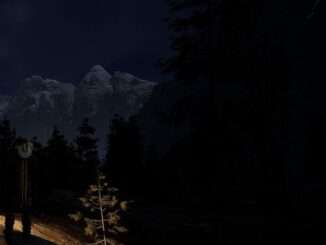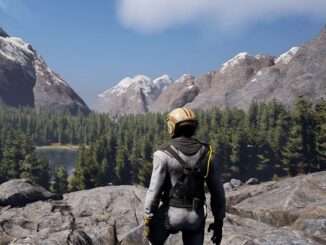
A how to guide for prospectors who wish to begin collecting Exotics.
Guide to Extract Exotics from Start to Finish
Lore: What are Exotics?
Exotics are a previously unknown seemingly natural forming metamaterial that turn the known laws of physics on their head. These treasures have only recently been discovered on Icarus – A moon of the gas giant Minos orbiting Proxima Centauri. 4.25 Light Years or 40 Billion kilometers from Earth. New laws of physics will need to be discovered for this material and much like the discovery of splitting the atom; Goverments want it for the power. Corporations want it for the profits. You, a Prospector, want it to sell to those groups and get rich.
Game Play: What are Exotics?
For game play, Exotics are the ever present MacGuffin that motivates you to risk your life to collect them. They are a currency for the workshop items and a simple measure of meta-progression. Collecting more gear from the workshop is a clearly measurable form of player progression that continues after your character has reached max level and unlocked all the tech recipes.
How-To: Overview
Collecting Exotics is a three part process: Find the Exotics. Collect the Exotics. Return the Exotics.
Finding the Exotics deposits is primarily done using a Radar. Olympus has a limited number of deposits so you can theoretically visit each in turn following a map to find which is active.
Collecting the Exotics is done overtime using Extractors. Two Extractors can be placed on each deposit to speed the process.
There are also Exotic voxels that can be stumbled upon in caves but they are not abundant enough in caves to focus your search on. These can be collected using a pickaxe.
Returning the Exotics is done using the Orbital Exchange Interface. The Sinotai drop pods are equipped to handle delivering your Exotics find to orbit.
Equipment: Radar
There are three radars Prospectors can use to scan the area for Exotics. They represent different tech levels but all behave the same. They all are carried in your character’s bulk slot – the G slot, directly to the right of the hotbar – which limits you to carrying no other bulk items while scanning.

Biofuel Radar
The biofuel radar is the lowest tech radar and it can be crafted in the machining bench. It simply needs a can of biofuel to be inserted and it will scan away. A single can of fuel will easily last until you find all of the exotics nodes on your map.

Electric Radar
The electric radar is a more advanced radar constructed in the Fabricator plus you need composites for this radar — that means your base needs at minimum an electric furnace and the material processor. Extremely late in the tech tree and the convenience of the bio-fuel radar is gone. With the electric radar you need to setup a power source and run a wire to the radar to power it. The scan is performed slightly faster and the stat for precision is there but it’s just not as convenient as the bio-fuel version.

IC-001 Radar
The workshop IC-001 radar is a great convenience purchase when you have the exotics. It can be called down when you need it via the Orbital Exchange Interface and is self-powered. Thus you’re not carrying it and a fuel can around everywhere you go.
Radar Stats
The stats for radar scanning speed and animals attracted are pretty easy to understand. The Radar Precision stat is kind of a mystery. As far as I can tell it causes the result arcs to thicken sooner giving you more detailed results from further away making it easier to narrow down your search faster. I also believe it tags the deposit waypoint from further away. Both aspects will be explained in the next section.
How-To: Find Exotics
Running the radar to scan for exotics creates a mini-horde event. Three to six animals will come attack you while the radar is actively scanning and you need to prevent the radar from being destroyed. Generally it’s not an issue – everyone is a little combat capable.
However there are better locations than others to scan at. If you can find an elevated spot to stick the radar for safety do so. Sometimes the critters sent after you can be pretty intense. For example from my experience scanning in an arctic zone on Styx I’ve had a mammoth, a polar bear, a snow leopard, and two arctic scorpions attack all in quick succession.
Building up on rocks or even creating your own out of reach platform can reduce or eliminate the risk.
Rock Top

Platform Position

Scan Reading
Now that your scan is done, how do you read it? It’s simple enough once you are walked through an example. The scan results will put a circular indicator on your map with a yellow arc for each exotic deposit available to extract. Some maps can have up to three deposits so the result can look confusing but it’s really just three results stacked on top of each other. Once you get closer to a deposit the results will be easier to tell apart. When a deposit is mined out it will no longer show up on new scans.
The arc line thickness indicates how close you are to the deposit – narrow means further away. The arc line angle indicates the direction to the deposit and the further away you are the wider the angle indicating the scan’s uncertainty.
Here is an example of hunting down a deposit. The red lines radiate from the arc line we’re focused on and illustrate where you should be looking for your next scan:
Initial Scan

From the first scan you can see that there are three results. The very thin line covering almost a full 180 degrees to the east, a slightly thicker line with the arc covering the east/southeast direction, and an even thicker line covering an arc to the southwest. That thickest line will be what we focus on because it indicates we are closest to that deposit. So we head in the southwest direction to perform another scan.
Second Scan

As you can see we’re getting closer. The arc we’re interested in is getting thicker and the arc angle is getting smaller and more precise. Still pointing in the southwest direction we move to scan again.
Discovery Scan

Moving futher southwest our third scan was close enough to tag the deposit directly. That crystal shaped map icon (circled in the image) is the deposit. The waypoint will now appear on your HUD compass and allow you to directly walk to the deposit. As you approach the exotic deposit, you’ll even get a bit of musical fanfare to congratulate you.
Deposit Discovered

Note
There is a minimum distance you must be to get results from another scan. Basic rule of thumb is to make sure your scan result circles won’t overlap each other and then add a little more. This means you could end up scanning on one side of a deposit then run by the deposit without seeing it to scan from the other side and still not have the deposit waypoint tagged for you. The deposit is still there, you just have to find it with your mk1 optical equipment.
With the higher precision radars this usually won’t be an issue. Here’s an example of the IC-001 radar with +33% radar precision tagging a deposit waypoint well outside the radar results circle:

Equipment: Extractor
There are three exotic extractors Prospectors can use to extract the Exotics from a deposit. They represent different tech levels but all behave the same. They all are carried in your character’s bulk slot – the G slot, directly to the right of the hotbar – which if you just found your deposit is currently filled with your radar.

Biofuel Extractor
The biofuel extractor is the lowest tech extractor and it can be crafted in the machining bench. It simply needs a can of biofuel to be inserted and it will extract away. A single can of fuel will most likely not last until you extract all of the exotics from a deposit. You may need anywhere from two to four cans of biofuel for each deposit so plan on bringing your biofuel composter along with a mortar and pestle when using these.

Electric Extractor
This extractor has a considerable speed advantage over the biofuel extractor. Like the electric radar, the electric extractor is constructed in the Fabricator. Unlike the electric radar, the electric extractor does not require any composites and thus it can be crafted immediately in the Fabricator with a wiring tool and a biofuel generator. A single can of biofuel will fuel the generator to power two extractors through three exotic deposits with no issues.

IC-001 Extractor
The IC-001 Extractor has the same speed advantage as the electric extractor plus the added advantage of being workshop gear you can call down from orbit anywhere with an Orbital Exchange Interface. Like the biofuel extractor it requires a fuel canister installed which is also purchased in the workshop.

IC-001 Prototype Power Source
As noted in the image, it cannot be returned to orbit but you can send the extractors back to orbit and carry the power sources to the next exotic deposit. Two of these are typically enough to extract three full exotic deposits but occasionally a third will be required. The cost of 50 Ren translates to a cost of 10 exotics a piece which for the convenience of calling extractors down from orbit is worth the cost.
How-To: Extract Exotics
Now that you’ve found the deposit all you have to do is setup your extractor of choice and turn it on.

Deposit Extraction
A pair of extractors take anywhere from 20 to 40 minutes and each extractor will need to be emptied periodically to keep operating. There are also the extractors that require fuel so the extraction is usually not a fire and forget operation.
Extraction Defense
One thing to note with extractors is that they are the only piece of equipment that actively agro wildlife just by being in place. Even when not turned on. This does not result in a wave attack like the radar all it means is that if a animal wanders close and sees the extractors, they will bite it. Just like your character. Precautions should be taken to prevent your extractors from being destroyed.
Shelter and Walls
The most straight forward approach is to build walls around the deposit. Since you also need to spend 20 to 40 minutes nearby building a shelter as well can make your stay more comfortable. Setting the shelter over the drills allows you to tend to them without leaving the shelter.
From my experience placing walls three blocks from the deposits prevents animals approaching close enough to agro on my character and the extractors allowing for AFK stints in the shelter between emptying/refueling the extractors.

Creature Deterrent
The creature deterrents work well in most cases to keep your extractor safe as well.
The biofuel variant can be crafted in the machining bench and pairs well with either the biofuel or electric extractors as you’ve already built up to that point. Be aware that you should clear the protected area of wildlife after placing the deterrent just to be safe.

Equipment: Orbital Exchange Interface

It’s a simple device, and once you have it you’ll never want to leave home without it.
You can operate it to purchase any of the workshop gear for your orbital stash and then call down a drop pod loaded with anything from your orbital stash except envirosuits. They don’t recommend removing your helmet while on planet.
The OEI also allows you to send your workshop gear back to your orbital stash and is the only approved way to send exotics to orbit.
How-To: Deliver Exotics
Once you have extracted the exotics sending them to orbit to cash them in is simple. Use the Orbital Exchange Interface to call down a drop pod and load it up with your exotics. If you used workshop extractors you should already have a drop pod on the ground that you can use and you can send your extractors back up with the exotics.

Once the drop pod is loaded, send it on its way by clicking the Deliver to Station button. You’ll immediately get a update on the left side of the screen with the results just like completing a mission or operation.

Now you can pack up your gear and head to the next deposit!
Prometheus: Red Exotics
Prometheus added a new workshop currency in the form of red exotics. The mechanics are basically the same with an added step.
Radar
The radar procedure is exactly the same, only instead of deposits you’re finding organic growths in the lava biome.

Harvesting
Once you find one you need to setup a harvester instead of an extractor. There is only one option currently.

Exotic Harvester
It needs power and composites so you might as well add in an electric creature deterrent while you’re at it.
Cleansing
The harvested material is picked pretty quickly, is not fit for use, is fairly heavy and doesn’t stack very high. Transporting it to a base with water to be cleansed is the extra step some find challenging.

Organic Residue Cleanser
The harvested material gets processed in this machine and the result can finally be loaded into a drop pod and returned to orbit like the other exotics. The process is fairly long so setting up a couple or more to operate together is advisable.
Summary: On Your Way!
Hopefully the contents of this guide have imparted at least the bare minimum info needed to get you started on your exotics hunting rush. The mechanics are all pretty simple once the mystery is removed so good luck and don’t feed the bears.
Extra: Tips and Tricks
Exotic Deposit Locations
Exotic deposits are static locations all over the map but they are randomly activated. So if you traveled to all of the deposits locations you could find the active deposits without using a radar. Olympus has the fewest locations and Styx and Prometheus have progressively more making the radar almost indispensable on the harder maps.
Missions
Missions are the fastest way to gather exotics. Each mission has between 1 and 3 exotic deposits active and they can be extracted without actually completing the mission. So you can drop in, spend 5-10 minutes to craft an orbital exchange interface and then use your workshop radar and extractors to find and extract the deposits all in under two hours.
Open World
Open World has exotics available with a respawn mechanic. Three hours after a deposit is emptied a meteor shower will occur. The meteors will strike the location of an exotic deposit and activate it. You can even look up and watch the meteors to get an idea of where they are impacting. Only three deposits will ever be active at the same time and each meteor event will reset your radar scans.
Shelter on the Deposit
The building pieces won’t allow you to place directly on the deposit but you can place near it. Then while snapping to those pieces build directly over the deposit. The extractors will not collide with the building pieces allowing them to be placed after the shelter is installed.
Biofuel Tech Level
If you have enough weight capacity you can carry a biofuel radar to perform your deposit search, three biofuel cans, a biofuel composter, a mortar and pestle, a machining bench, the orbital exchange interface, and enough material to craft biofuel extractors plus a little extra. 56 iron ingots 77 gold wire 40 copper nails to be specific. This load out will let you do all the exotic extraction without returning to base.
Find your first deposit, setup a shelter for the machining bench, drop your radar in the bench and craft two extractors to set on the deposit and run them. Swap out the fuel cans occasionally and fill the extra while you wait using the mortar and pestle and the biofuel composter. Once you send the exotics to orbit, pick up and destroy the extractors in your inventory to regain 1/2 of the material rounded down used to create them. Pack up and move on.
Keep scanning to find the second deposit. Repeat. At the third and final deposit destroy the radar to get the remaining gold wire and iron ingots needed for the last extractor. Then call down a drop ship recall beacon when you’re finished.
Electric Extractors
You can do a similar loadout with the electric extractors – skip the electric radar. Biofuel radar to scan, two biofuel cans just in case, biofuel generator, wiring tool, fabricator bench, and electric extractor parts. 74 iron ingots and 22 electronics. Same deal, get the extra iron from your radar at the last deposit.





Be the first to comment